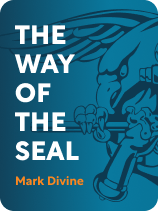

This article is an excerpt from the Shortform book guide to "The Way of the SEAL" by Mark Divine. Shortform has the world's best summaries and analyses of books you should be reading.
Like this article? Sign up for a free trial here.
What is the importance of a mission statement? What makes a strong mission in a business?
When you’re starting a new business in the modern work world, you need a mission statement that will keep your company afloat through unpredictable times. With advice from Mark Divine’s book The Way of the SEAL, you’ll be able to set a mission statement that will lessen the risk of failure.
Continue reading to learn more about the importance of a mission statement.
Set a Strong, Clear Mission
In his book, Divine perfectly explains the importance of a mission statement: when you start a new business in today’s unpredictable, ever-changing work world, you can mitigate the risk of failure and increase your organization’s resiliency by having a strong, achievable company mission that keeps you and your team focused on your objective. A clear mission makes it easier to determine where to target your resources so you don’t squander them, which helps you lead your business to success.
(Shortform note: Divine describes a company’s “mission” as a goal, rather than a company mission statement, which states a business’s purpose, values, and overarching goals. Divine’s use of “mission” is presumably rooted in the “missions,” or military operations, that SEALs perform.)
A strong mission is:
- Simple and achievable
- Important to you and your company
- A strong fit for your time, resources, and the talents of your team
- A good return on investment (in other words, the outcome will make the time and money you put in worthwhile)
- Timed well (new and needed in the market now)
- Easy to communicate to your team
Complement Your Business Mission With a Personal Mission Statement
In The 7 Habits of Highly Effective People, Stephen R. Covey says you’ll be more successful in achieving your goals if they align with your personal mission statement. Your mission statement serves as the standard by which you measure and determine every action. It should focus on three things:
- Character, or who you want to be
- Contribution, or what you want to do
- Core values, which govern your character and contributions
To develop your personal mission statement:
- Reflect on and assess your strengths and values honestly.
- Respect that the process is as important as the final result, and allow yourself the weeks or months it may take to develop a thoughtful statement.
- Identify your many roles (mother, sister, aunt, child) and create goals for each role that help you create the life you want.
Communicate Your Goals Effectively
To lead your business successfully, you have to communicate your mission clearly to every person helping execute it. When you help your team understand your mission and their role in making it happen, you eliminate confusion about who needs to do what. This enables everyone to focus on their job and work together to achieve the big-picture goal.
(Shortform note: If your company operates remotely, it may be hard to communicate with your team. To do it well, experts recommend that you reduce “affinity distance”—in other words, interact with your team in ways that increase trust and interdependency. For example, hold video calls rather than relying on email, which offers fewer visual and verbal cues about tone and how people feel. Also, create opportunities to celebrate your team to strengthen bonds.)
Divine says the most effective way to communicate your mission is to frame it as a compelling story that’s relatable and easy to understand. For example, to tell the story of a business you’re launching, talk about your big picture idea, the product or service you want to sell, and the path you and your team will take to make it happen. Brief your team on their roles, including specific steps each person will take to execute the mission and what to do if things don’t go according to plan.
(Shortform note: Experts recommend some other tips to tell a story that resonates. First, keep your story tight with a headline-style first sentence—it should grab the attention of the people you’re talking to, convey the stakes at hand, and close with a clear ending that doesn’t meander. Second, practice telling your story before you share it so it becomes ingrained in you. Third, remember that telling a story is not about you, but connecting with the people you’re talking to.)

———End of Preview———
Like what you just read? Read the rest of the world's best book summary and analysis of Mark Divine's "The Way of the SEAL" at Shortform.
Here's what you'll find in our full The Way of the SEAL summary:
- A former Navy SEAL's strategies to help business leaders
- A mind-body technique that combines yoga, martial arts, and SEAL training
- How to bolster and harness your mental fortitude






